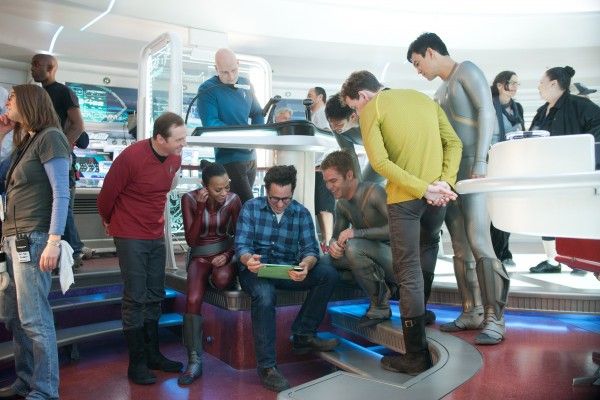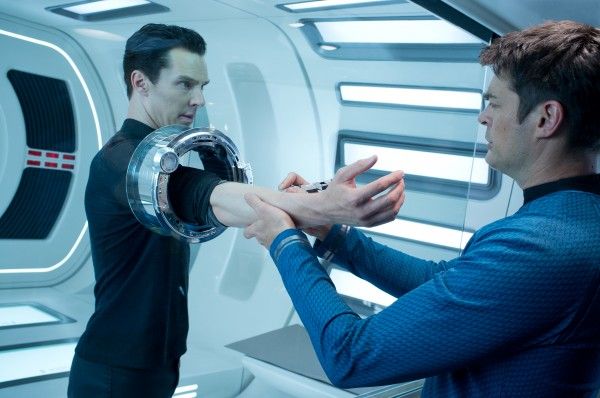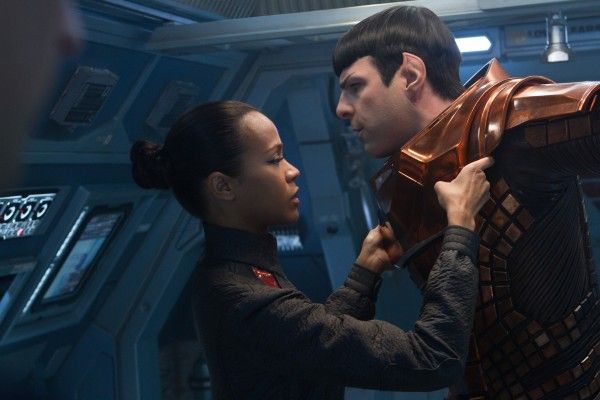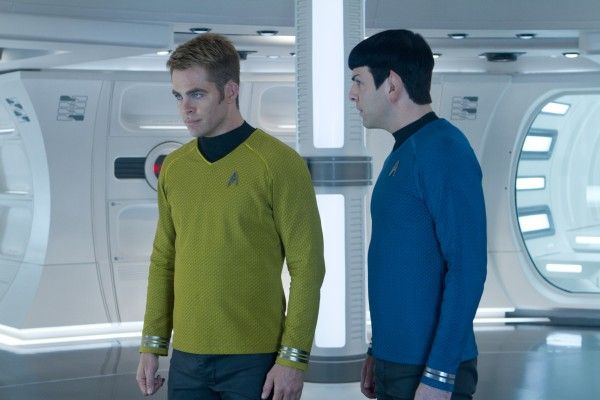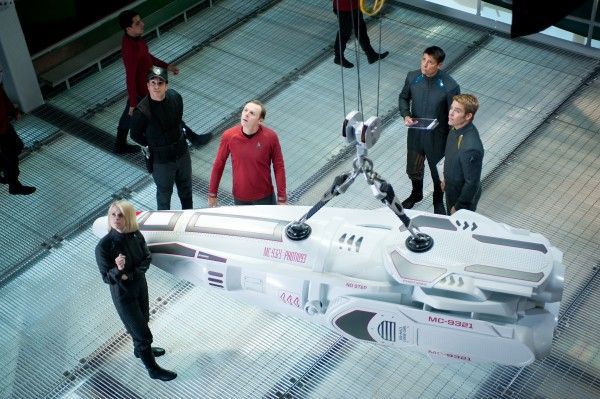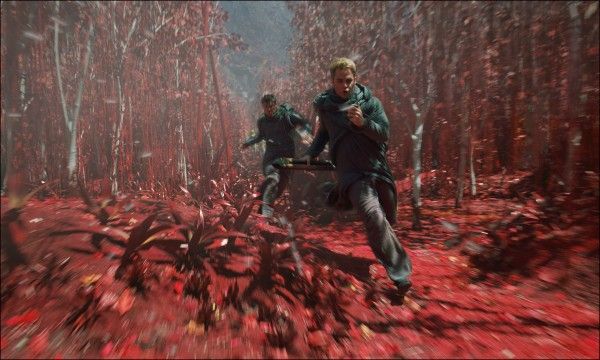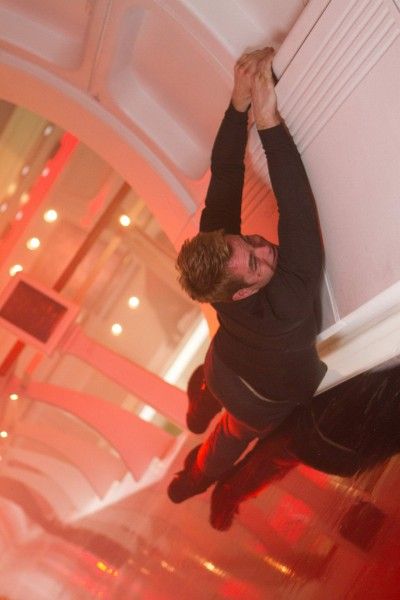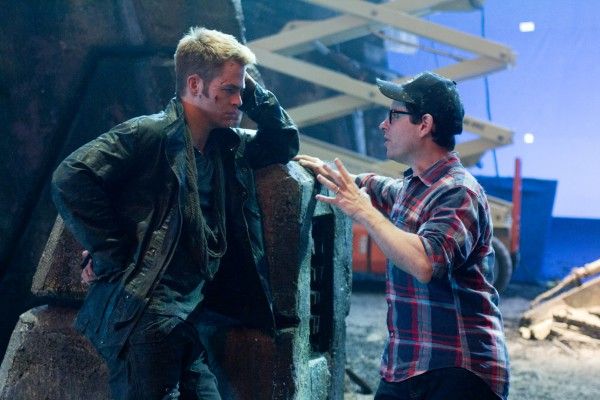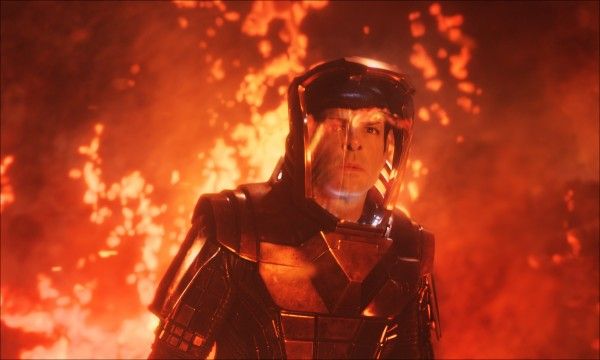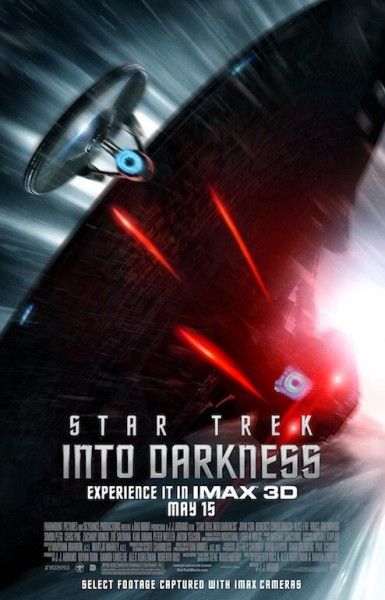While everyone associates Bad Robot with J.J. Abrams, he actually has a producing partner that rarely does press and usually stays out of the limelight: Bryan Burk. If you look over his IMDb profile, you'll see he's tremendously involved in all Bad Robot productions and was a key component in both Star Trek and Star Trek Into Darkness.
With the movie getting ready to premiere around the world, I recently landed an exclusive interview with the busy producer. During our wide-ranging interview, we talked about making the sequel, the editing process, the secrecy, the title, if we'll get Star Trek 3 in less than four years, whether a new Star Trek TV show could happen in the near future, and more. We also talked about other Bad Robot productions like Star Wars, Mission: Impossible 5, Infinitely Polar Bear, Person of Interest, Revolution, Alfonso Cuaron's pilot Believe, Karl Urban's pilot Almost Human, and more. Hit the jump for what he had to say.
Question: What the hell has this process been like? Because I know how much you enjoy doing press.
BRYAN BURK: Well, you know, this is easier because in theory we’re just talking about Star Trek so it’s easier to talk about things that are out or coming out earlier because the fear is always that I will slip and talk about something prematurely. So, that’s it.
I want to keep it spoiler free, what was the length of the first cut?
BURK: Good question, it wasn’t that long. I want to say maybe 2:20, I don’t even think it was 2:30, I think somewhere right around 2:20.
What was the process like in the editing room getting that first cut to the theatrical release?
BURK: It’s interesting because the way J.J. cuts - we’re very close with our editors as well, so it’s kind of the first cut and then he went back and started tightening things up, etc, then loosing things when it was too tight. Then you start watching it and you start figuring out performance – not performance, character-wise I should say, who you’re really able to follow, whose journey is harder to follow, and you make all that work. Then we started looking at story and what was making sense and what wasn’t making sense, emotionally and thematically the intention that we had a year earlier when they were working on the script, did all that come across? It’s all kind of generic things, but it’s fascinating and it’s weird – I haven’t made that many films, but it’s weird that every time you think you learn from your mistakes on your last film you have a slew of new mistakes and things that you learn. So it’s an interesting process just going through and seeing what works and what doesn’t work, and what’s the best version of it. It was a good process because I think we all collectively, when everyone would run into issues in the cut or know that things weren’t working, they kind of glaringly stuck out so we could focus on fixing those things and it wasn’t a situation where you would show it to ten people and you would have ten problems.
I’m a huge fan of not learning everything about a movie and while some people might be frustrated, I love the secrecy you guys place on projects, however because of the secrecy you guys can’t really do test screenings the way most studios and films do things. Who are the friends and family that you show the movie to that you really trust to give you feedback before the release?
BURK: Yeah, we definitely have screenings; we just don’t have screenings out on the street. We bring in – it starts internally, so its people who work at Bad Robot, then it starts going to our friends outside of Bad Robot, and then it starts going to friends of friends outside so we get really fresh people who don’t have to pretend to like us. It’s an invaluable part of the process, obviously, having test screening and you definitely learn something. There’s an overlap of people we’ve used from previous films and we also like to obviously bring in new people so we get a fresh voice and opinion when you bring them in. All different ages and genders and everything, you just want a wide spectrum of people who are coming in to see what works.
What did you learn in the screening process for the Trek sequel that perhaps you worked on in the editing room as a result?
BURK: Well consciously what we were doing when making the film was, we really wanted to make sure it was a film about – in our mind it was never really a sequel, it was its own movie going forward and it’s why the movie doesn’t have a number by it. It was a film that you should be able to jump in, if you’ve never seen it before you’d be able to jump right in, and obviously if you have seen it then you’ll be bringing your own emotion to it. We wanted to appeal to both. It was really important to try to reach a whole new audience so we had a lot of people in who not only had not seen the last film but were not Star Trek fans, or thought of themselves as not being Star Trek fans, or they had seen bits and pieces of Star Trek in the past and it was just not for them. So that was an important part of the process and strangely, early on, we started to realize, in that respect, we were successful in what we were trying to do, which is make a film that everybody would be able come out and not be scratching their head at all. And more importantly what we found with those people is that a lot of them said, “Hey it’s not what I thought it was going to be.” Which is a great reaction, particularly if they liked it.
Were there any alternate titles to Into Darkness that came close or was Into Darkness always the title you were going with?
BURK: We were going to call it “Star Trek: The Avengers”, and for a while we were like, “People are going to love that title”. No, we had a whole bunch of titles, we never had any official title until we came out with this, we had different conversations about other things. This was one of those, again, there’s a lot of people, there’s five of us as producers, there’s a lot of conversations about what’s good, and everybody has different opinions. Then, as with anything, when the right thing appears everyone - kind of unanimously everyone was like, “Oh, that’s it.” So it was something that we all loved.
Obviously with Star Trek cannon you have the “red shirt”. Talk a little about how much discussion you guys had about having a good moment for a red shirt in the sequel.
BURK: We definitely had conversations about it early on and, you know, you can’t put everything in. The “red shirt” moment is obviously the moment when Chekov gets his red shirt, which isn’t as big as the “red shirt” moment from the last film. As you talk about it – and I’m the worst one to be talking about it because I do not know Star Trek cannon as well as I know other cannon, but I’ll hear my fellow producers, who do know that world much more, talk about a whole bunch of things. When we start talking about these films there’s a whole bunch of things on the table that, time permitting, they would be all over the film. it’s just you can’t do everything in ever film. Even in the last film we introduced Klingons, but you never saw it because in the final cut it didn’t work for us to bring them in. Fortunately they made it in this film. But there’s just a lot of possibilities, particularly in a world that’s been around for 45 years, of things you can put in. If they’ll continue to let us make these films well continue to keep populating it with things that impress.
I’m curious if there are any Easter eggs that are in the background that fans should be looking out for on their second viewing?
BURK: That’s a very good question…I’m trying to think right now off the top of my head and I think there is, but I can’t remember because we had conversations early on. There’s one I can’t really address comfortably yet, I don’t want to say yes and have people looking for things that ended up not being in it, but there might be.
I said this at the beginning of this interview and I’ve told you this right to your face, I love the fact that you guys keep things really close to the vest.
BURK: No, I know, I know.
Obviously you don’t know if the sequel is going to be as big as the first film, but assuming it is for fans of the Trek franchise, do you think that another movie would come along sooner than four years? Or is that the hope?
BURK: Well, truth be told it was the hope on the last one, it’s always the hope. It’s just you don’t just wasn’t to do it- everything we do is, for a lack of a more crass term, everything we do is pushing against the conveyer belt. There is just this need to feed the beast of movie, or TV, or whatever it may be and you don’t want to do things just because you’re supposed to do them, or because they’re required, or whatever it maybe. Is it inevitable after a successful film that they’re going to ask for another one? Yes. Do we want to rush and do it for that reason? No. So that’s one of the reasons why we took time between the last one and this one, was to make sure that we could do something that we believe could be equal if not better than the last one. In this case we already have ideas of things we’re talking about, and I think in a perfect world it will not be a four year break and it will come out significantly sooner than the last.
I’m a huge, huge fan of Star Trek on TV, watched all the shows, you guys at Bad Robot seem to be quite good at producing TV. Have there been any conversations about doing some new version of Star Trek on TV that obviously doesn’t focus on The Enterprise, but maybe another aspect of the Star Trek universe.
BURK: I mean…yeah, we definitely had conversations about it, I just feel like in the land of walking before you run that we’re still only one film in, I mean the second one hasn’t even come out, and we are trying to galvanize this version of Star Trek and help it be its own thing before we jump in and start doing those. It feel like it’s definitely something we have talked about and something we would like to do at some point, but right now our focus is on just the films.
If we can just break into TV for a second, how involved are you in TV stuff? Or are you sort of like and overseer and they come to you with little things?
BURK: It depends on the project, what’s happening that day on the project, at what stage were in on the project; it various from project to project and where we’re needed. So in Person of Interest land I wish I was doing more on a daily basis, although Jonah [Nolan] and Greg [Plageman] have such a handle on that show it’s crazy how well they are running that show. To the point that it makes me feel like I’m a total idiot for everything I’ve ever worked on because I’ve never run it as smoothly as them. Revolution, same thing, [Erik] Kripke is really up and running on Revolution, although I’ll be involved at this point, or maybe in the pilot, or wherever it may be. We now have two new pilots so it’s kind of running between those when necessary, but again, we’re fortunate in those situations where Joel Wyman who was our co-showrunner on Fringe for most of its five years, and were using the same crew from Fringe. So there’s already a good machinery in place, for lack of a more disgusting word to describe what we do, but there’s already an infrastructure in place.
And on the other side we have this new Alfonso Cauron pilot that we did and my job in working with Alfonso Cauron is to clear the runway. He co-wrote it with Mark Friedman and they are so on top of it in a way that, you know, he is a brilliant auteur film maker for a reason. I just like watching him do what he does and anything he needs I’m there. So it depends. And, by the way, the time comes where it’s like the episode isn’t working or whatever it may be, so I will spend hours on end in an editing room, or on a sound stage, or working on a script, or whatever it may be. And the same goes for JJ, I mean there were plenty of times even in the middle of mixing Trek, locking that, and doing a final dub on Trek where we were working on scripts for one of the pilots and JJ had all these ideas and things he wanted to address on one of them. It is constantly going where you are needed and it’s a lot of work, but it’s also this crazy, lucky place that we’re in where they’re allowing us to make TV shows and make movies, and there’s nothing any more that I’ve ever wanted to do in my life nor would I want to do in my life, so I feel like any opportunity I have to go work on all these different things that were very excited about - I’ll be there.
I’m actually very excited for Human and Believe, you guys landed Karl Urban for Human, what can you tell people about both shows and when will you find out if the pilots got picked up?
BURK: I’m hoping we’ll find out by next week, by the end of the week, because I think upfronts are the following week so hopefully we’ll start hearing things. I can give you like one-liner loglines on both of them, although it won’t do them justice because they’re not at all as simplistic as the one-liner that I can give you. But, Joel Wyman’s project, which is Human, is one of those ones that when we heard the idea it was like, “How is it that this isn’t already on air?” It just appealed to all the things that we love with a great blend of humanity, emotions, and possibilities of great science fiction without being over the top. It had elements of things that we just loved in previous movies, books, and TV shows but there was really nothing like it on TV. It kind of exemplified that thing that JJ has said before, which is it’s kind of a B-movie gone A. And then on the other side Alfonso came in and pitched us this idea about a year ago, and when we heard it - it was so amazing because it was so unlike anything that I had seen before on television, particularly through the eyes of Alfonso Cauron where if he can do what he does so well in movies and move it to television it would be this amazing, emotional, unique experience. And it’s amazing, watching the pilot is so signature Alfonso Cauron I can’t wait for people to see it.
I watch Person of Interest, I know a lot of people that do, I really enjoy the show, are you a little bit surprised at the success? Because I believe it’s one of the highest rated shows.
BURK: I am surprised any time we have any success on anything, so Person of Interest is no different than anything else we do. However, do you know Jonah at all?
I’ve talked to him before, but I’m not close with him the way I’m close with other writers.
BURK: He is just, aside from being the greatest, most personable person on the planet, and a ridiculous genius writer - and director for that matter, his sensibilities are so in touch with…kind of a mass audience. His ability to make things that are really thought provoking, ambiguous, and wonderfully deep characters, and kind of throws you into this world where you’re always on the edge of your seat and you don’t know where you’re going to go. He really is that great storyteller who takes you by the hand, leads you where you don’t know where you’re going, and it’s always a surprise. In watching from the original pitch in J.J.s office when he pitched it to where we are now, I’m excited that people are watching the show and it’s been fortunately a successful show, but I can tell you knowing what Jonah has done so far, let alone where we’re going with the show, is people haven’t seen anything yet.
That’s what I wanted to ask you when he came into pitch and when you pitch for the network, even with shows like Human, when you go to pitch the network are they now asking, “What’s your five year plan?” Or are they asking for your first year or two? How much do they want to know prior to saying, “Here’s a bunch of money”?
BURK: It’s a combination, I think they want to know – it’s for every show, which is I think networks want to know that you have a vision for where the show could go to make sure that it really is a show, that it’s not just a one-off forty minute pilot, that it’s an actual series. And then simultaneously I don’t think they’re asking you to necessarily write in stone that this is what you’re going to do or what you have to do. As J.J. has said many times, when you start a series you want to have a destination. It’s like driving a car, when you pull out of your garage and you head out driving down the road, you have a destination, okay? You may change your destination, you may have a hundred stops along the way, there’s a hundred different possibilities, but usually when you get in your car you are thinking, “I am going to go somewhere.” We approach our shows the same way where we just have a map and we present them to the network so that they realize that, all things being equal, we can definitely head in that direction. Sometimes we do and sometimes we find better ways along the way.
What’s the status of another Mission Impossible movie, even if you guys are just producing?
BURK: We’re working on it now. We only produced the last one as well, so we’ll be having the same role on the next one as we did on this one.
I guess my question is how far along is it in terms of actually being in front of cameras? Does the studio have an idea on a release date?
BURK: You know, things come up and we have those conversations. I feel that they’re all in a kind of similar state, which is that we all keep working on them, in house, until we feel like it’s ready and then it goes from being something that were working on to ready very quickly. Keep in mind that we are producers with Tom Cruise so we also have Tom’s schedule that we work around and work with as well. But as far as the development of the next film it is a process that, be it Star Trek, be it Star Wars, be it Mission Impossible, be it - it doesn’t matter what it is, it is all stuff that we try as best as we can to work on making the best possible film we can, and then once we feel like, “Oh here it is, it’s all coming together,” then the freight train starts moving very quickly.
Besides a certain franchise that everyone’s talking about you guys are producing a bunch of other things for feature films, what else is bubbling up to the surface in terms of getting ready to go? What other films are you excited about that Bad Robot is doing?
BURK: To be truthful, and I’m not being coy, it’s what I just said, which is there are a lot of things. We just had some scripts come in recently, internally, that we’ve been developing that are awesome, like spectacular, and they are all different size films. We have some much smaller budget, we have some medium budget, and there’s another very big budget floating around. So it all starts being like, “Okay, what’s the process? Where are we going to go next?” We have our first independent film that are doing right now called Infinitely Polar Bear which Maya Forbes is almost done directing, she has one week left. Mark Ruffalo and Zoe Saldana are in it and it’s great. It’s this really small film about a bi-polar father who has to raise his two daughters and it’s autobiographical for Maya. It’s a very special script that we’ve had for a while. There were all these different start dates, and then all the sudden these pieces started coming together and the next thing you knew we were starting that film. It started the same day that we ended production on Human, on our pilot there. It was the same time that we were in the middle of just starting the mix for Star Trek: Into Darkness. And it started at the same time that another script came in that is rapidly gaining momentum. It’s hard to tell you what’s going to be next because if I told you three months ago that Infinitely Polar Bear was going to be the one that was going to pop and be the one that was going to go - it wasn’t on the radar and, by the way, neither was Star Wars at the time. So things come together for different reasons and when they are ready to go, the pieces are all there, everybody’s availability is working and everything starts lining up, that’s when we go.
I’m just going to try and ask you a Star Wars question or two, stuff that I hope you can answer without any drama, but if you don’t want to answer just let me know. Do you know where and when you might be filming?
BURK: We’re progressing on a schedule to hopefully begin next year, or the beginning of next year, and the location is still kind of floating around in the air all depending on script and a whole bunch of other issues. As I just said, everything is kind of a free-flowing thing, and when we feel like the story level on this script and everything is really coming together and schedules are all working and pieces line up, we prowl ahead, and Star Wars will be no different.
Are you a little bit surprised, even for you, about the level of interest or did you sort of know there would be a level of interest you’ve never had before on anything?
BURK: I mean, it’s Star Wars. It’s something that obviously has successfully been handed down from generation to generation in the last 40 years. If I weren’t working on the project, I’d have the same interest as everyone else because it’s something that I, too, am looking forward to seeing where the franchise goes next.
Note: Since I did the interview with Burk, it's been revealed that Star Wars Episode: VII will be filming in London. Here's the info on that.

